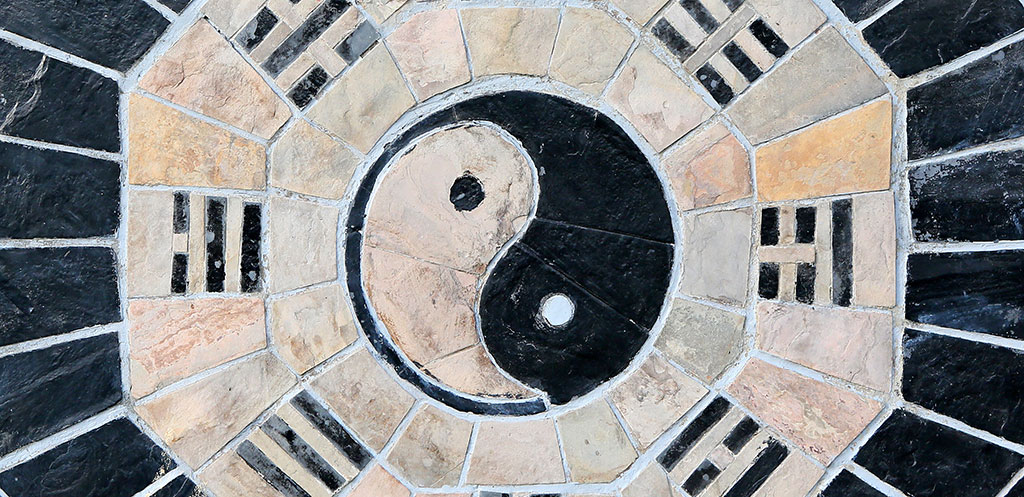Feng Shui is an ancient practice that originated in China. The word “Feng” means wind while “Shuai” means water. So when we combine these two words, we get “wind-water”. So the word feng shui means “wind and water”.
Basics of Feng Shui
In Chinese culture, people believe that everything has its energy which flows through our bodies. Such energies were named “Qi or ch’i or ki ” by the Chinese people of ancient China.
Feng Shui refers to the five elements: earth, metal, water, wood, and fire. The energy from these elements influences your home and the environment around it. When we touch something, we transfer our own personal “chi” onto other objects because we have a connection with them.

Feng Shui was developed over thousands of years to help people transform their lives following the laws of the universe and harmony of nature, using the energy of the sun, moon, stars, earth, water, and fire.
In addition, Feng Shui is based on the Chinese practice and belief that placing particular objects in your home can bring luck, good fortune, good health, and happiness. Therefore, it is an art of placement, arrangement and design of furniture in your home or office for good luck, happiness, health and prosperity in your life.
While there are many interpretations of Feng Shui Principles, it is mainly concerned with how a person places themselves physically within their living spaces and how their small and large choices affect the flow of energy in the surroundings.
The concept of feng shui has become more prevalent in recent years, with books, movies, and television shows making claims about its effectiveness. However, modern Fengshui has evolved beyond the ancient art of placement and is now primarily based on technology, such as energy analysis, feng shui software, and other powerful tools.
The 5 Elements of Feng Shui
Feng Shui is an ancient Chinese system that uses the five natural elements: earth elements, water elements, wood elements, fire elements and metal elements to predict and influence the energy flow.
Wood Element in Feng Shui:
The Wood element is associated with the earth, growth and stability. It represents a solid foundation for your life that will support you through all of its ups and downs.
FengShui Experts believe that energy from the wood element brings about change or transformation within yourself and others around you.
Wood element also has an affinity towards money and wealth.
Feng shui uses the colour green when referring to the Wood element. Green symbolises balance, harmony, peace, prosperity, abundance, health, longevity and good luck.
Water Element in Feng Shui:
The Water element is the most important of all five elements in Feng Shui practice. The water element represents emotions, intuition and creativity.
Water is a catalyst element, which means water can create changes quickly. For example, water is used in Feng Shui to help move or enhance energy in or around a space.
Water is an element that feeds and nourishes wood. Feng Shui experts use water features to deter stagnation, loneliness, and feelings of insecurity.
Earth Element in Feng Shui:
The ground represents the Earth element beneath our feet. When we walk barefoot, we feel connected to nature and the world around us. Likewise, in Feng Shui, the Earth element helps create a sense of security and grounding.
The earth element is often considered feminine and receptive. Plains and valleys are Yin (feminine) expressions of earth, and the hills and mountains are the Yang (masculine) quality.
In addition, the earth element also protects against negative influences. For example, rocks, Shells and Crystals are all earth energy in Feng Shui.
Fire Element in Feng Shui :
The fire element is active energy; it tends to be yang energy! Like water, fire is a catalyst element, which means it can create change quickly and is used for transformation and expansion.
Fire, when used appropriately, helps to improve the energetic circumstances of life. It has qualities of initiation, passion, command, courage, ambition, and determination.
The Fire element represents passion, enthusiasm, excitement, anger, ambition, desire, jealousy, lust, greed and envy.
Metal Element in Feng Shui
In Feng Shui, the Metal Element provides more focus and intense effort to demonstrate thoughts into physical presence.
The metal feng shui element is one of five elements, strengthening water and destroying wood. Earth element strengthens metal element, but water element can weaken the metal element.
The Metal element represents the body, mind, spirit and soul. It stands for strength, courage, determination, willpower, self-confidence, endurance, perseverance and wisdom.
Feng Shui Brings positive energy

The flow of positive energy is the most critical aspect of feng shui. Nobody wants to have negative energy in their lives or home. So to have a healthy home environment, it needs to make sure that your space is filled with positive energies.
Feng Shui placement is a key to bringing positive energy into your life. It has a straightforward understanding of the idea.
The basic principle behind it is based on the fact that everything around us emits certain kinds of vibrations or energies, which are either in a negative or a positive form.
Therefore, if we want our lives to be happy and peaceful, we should live near places where the energy is more positive than negative. This way we will get more benefits from our surroundings.
Positive Energy Flow: How Does it Work?
There are many ways through which one can bring about positive energy into their homes. One such method is by using Feng Shui techniques. These methods help people create an atmosphere within their houses that is conducive to happiness and prosperity.
It also ensures that people do not face problems like bad health, financial issues etc.
While using Feng Shui techniques, one must first decide what type of energy to attract into your house. Then, you may choose between different types of energy depending upon your needs.
For example, if you want to attract love and romance into your life, you would select red and some other colours associated with romanticism. On the contrary, if you want to keep unwanted elements from entering your home, you could opt for black and white colours.
You can also add objects that emit positive vibes into your room. A picture of someone who inspires you or something else that makes you feel great can change your mood when you look at it.
You can even put up pictures of animals or plants that give off positive feelings. There are so many things that you can do to increase the amount of positivity flowing out of your home.
A Feng Shui Practitioner studies the energy map based on your area’s Feng Shui Bagua map. It helps to understand, maintain and balance the flow of positive energy while countering the negative energy.
Feng Shui consultants will help to re-organise the flow of energy at your home or office using the Feng Shui Map for the best flow of energy based on their expertise and the Shui Rules. So you might as well receive quick Feng Shui Tips to route the flow of energy to some extent.
Disclaimer: The information provided here is only intended to provide general guidance. We cannot guarantee any specific results. Please consult a professional before making changes to your living spaces.

